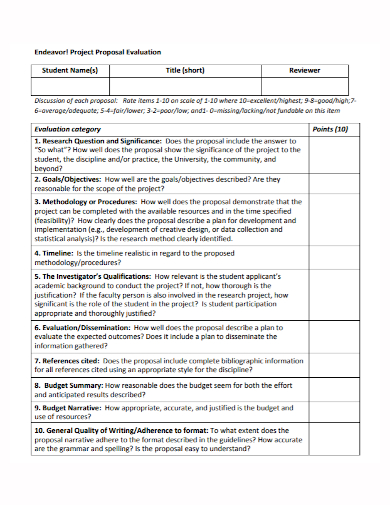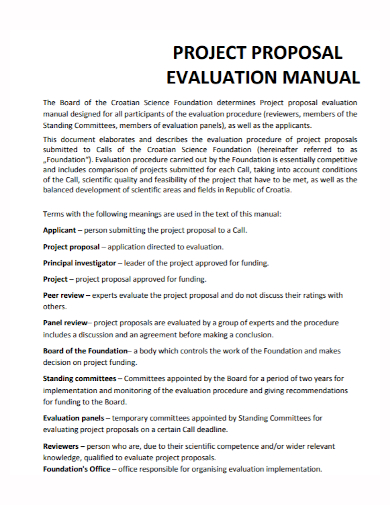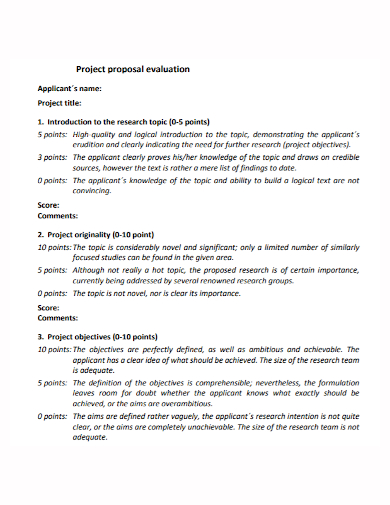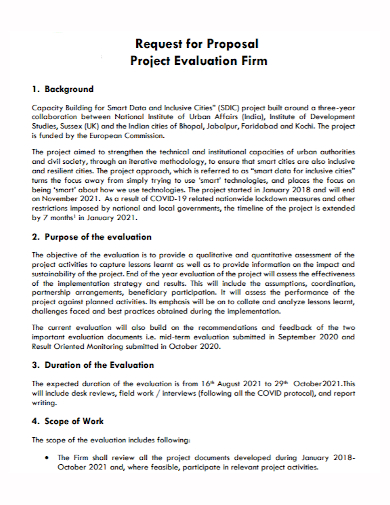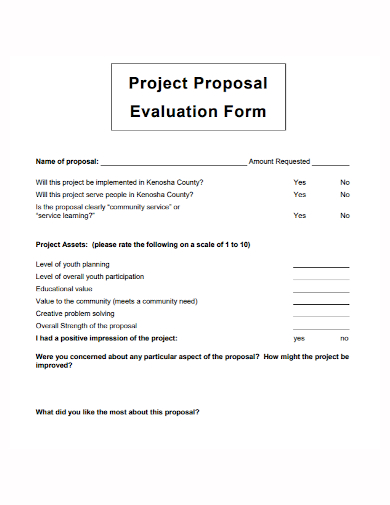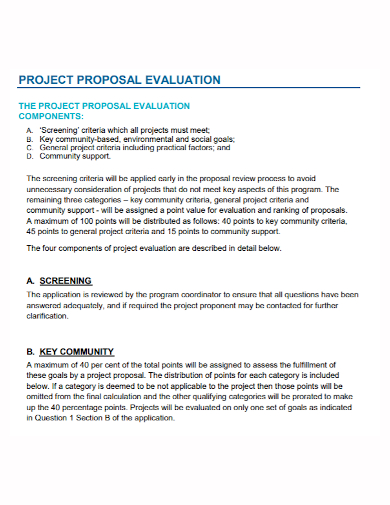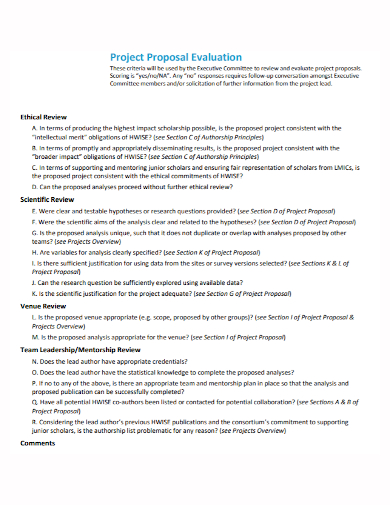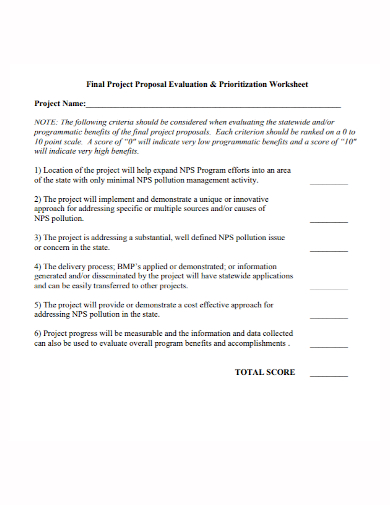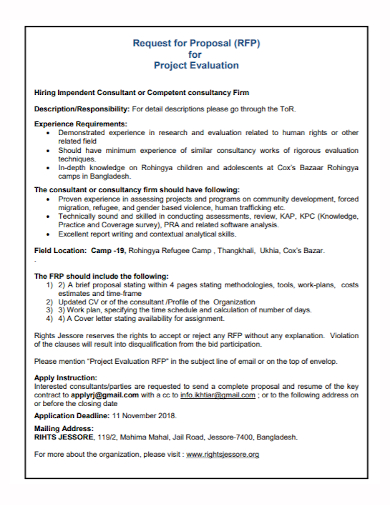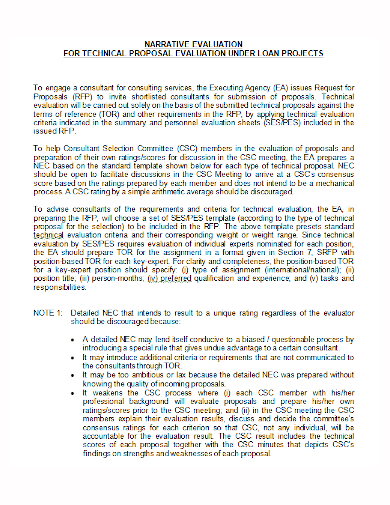Whether you’re a solopreneur just starting out in business or the CEO of a multibillion-dollar corporation, you need to keep track of how your organization conducts projects. Successful project planning includes assessing how effectively your projects have reached their objectives. You can collect and review information about a project, its many sub-tasks, and your team members with the help of project evaluation. Furthermore, now that you have all of the information, you may look forward to completing future assignments with ease.
10+ Project Evaluation Proposal Samples
What is project evaluation? The practice of reviewing an ongoing or completed project by gathering data at each stage is known as project evaluation. The purpose of a project evaluation is to figure out how far along a project is: is it on track to meet its goals and objectives? How many objectives have been met? What are the team’s current difficulties? What is the status of each team member’s performance? And so forth.
1. Student Project Evaluation Proposal
2. Project Evaluation Technical Proposal
3. Evaluation Manual Project Proposal
4. Project Applicant Evaluation Proposal
5. Request for Proposal Project Evaluation
6. Project Evaluation Proposal Form
7. Sample Project Evaluation Proposal
8. Project Proposal Evaluation
9. Final Project Proposal Evaluation Worksheet
10. Project Evaluation Request for Proposal
11. Loan Project Evaluation Proposal
Methods You Can Use For Project Evaluation
Project evaluation occurs at several points throughout the project life cycle, from inception to completion. To get a thorough picture of your project’s progress, you can use tools like surveys.
- During the start of the project, the project will be evaluated. Pre-Project Evaluation takes place before you begin working on the project; it is the planning stage of the project. In this stage, you collaborate with your clients and customers to discuss and present your project’s major requirements. You should now have a good idea of the project’s roadmap.
- Evaluation of the Preliminary Stage – After your team members have completed the first draft of the project, you will review it here. Any project’s early stages consist of a basic foundation and information. You provide vital suggestions and insights to further finetune the project via project evaluation in this stage— the more in-depth the first stage assessment, the better the chances of having an error-free project delivery.
- During the course of the project, the team will evaluate it. The project assessment process must be completed at all stages of the project’s development. For example, after completing the first stage of the project evaluation, you must closely monitor whether any adjustments have been made. Also, in the later stages of the project, you should give the expectations. For example, if you gave your team the green light during the project’s design phase, you’ll need to provide inputs for the project’s coding and testing phases.
- Evaluation of the Project at the End – After your team has completed all of the project stages, it’s time to assess the project as a whole. You may directly learn your team’s strengths and weaknesses by holding a team meeting, and you can develop a future strategy to address the flaws.
Benefits of Project Evaluation
- A better understanding of how budgets are used – Project Evaluation provides you with a firsthand look into how your project’s resources are being used. You may have set aside a specified budget for your project at the outset. However, after it’s finished and takes shape, you’ll notice that the budget was either underutilized or overutilized. Analyzing each stage can help you keep track of the true cost of your project: Which stage is the most expensive? Which stages can be completed on a shoestring budget, and so on.
- Recognize team members’ strengths and weaknesses – You gain a better understanding of each team member’s capabilities as you progress through the various stages of project evaluation. Some team members, for example, may have strong logical skills and be better suited to work in the coding sector, while others may have strong creative skills and be better suited to the project’s design stage.
FAQs
Does evaluation have something to do with project improvements?
Teams collect data in a typical learning collaboration to track progress and test change, which is crucial for improvement. While the project’s improvement advisers look at the big picture collaboratively, they don’t normally focus on the underlying circumstances of what’s going on and don’t usually make recommendations for project improvements. Evaluation, on the other hand, is decision-making research—a chance to push for adaptations and mid-course corrections that will optimize success. The evaluation outcomes benefit both the current project and future projects by providing lessons learned.
Do all grant proposals require an evaluation plan?
Although an assessment plan is not required for all grant bids, many program announcements and funding opportunities specify that an evaluation approach with specified milestones is an important factor to include. In most cases, if an evaluation strategy is required, it will be stated in the program announcement. Larger, more involved grant bids are more likely to require an assessment plan, whereas smaller, single-investigator submissions are less likely to.
Furthermore, evaluating the project at each stage decreases the likelihood of scope creep. To understand the errors and requirements, do a project evaluation during the pre-, current, and post-stages of a project. Finally, after each project, devise a course correction method in order to establish a project standard for the future.
Related Posts
FREE 11+ Engineering Project Proposal Samples in PDF | MS Word
FREE 4+ Racing Sponsorship Proposal Samples [ Team, Car, Driver ]
FREE 10+ Nursing Project Proposal Samples [ Community, Health, Clinical ]
FREE 11+ Student Council Proposal Samples in PDF | DOC
FREE 10+ Facilities Management Proposal Samples in MS Word | Google Docs | Apple Pages | PDF
FREE 8+ Joint Venture Proposal Samples [ Commercial, Real Estate, Construction ]
FREE 10+ Scholarship Proposal Samples [ Project, Grant, Sponsorship ]
FREE 10+ Computer Purchase Proposal Samples in MS Word | Google Docs | Apple Pages | PDF
FREE 10+ Network Project Proposal Samples [ Design, Security, Bank ]
FREE 14+ Accounting Proposal Samples in PDF | MS Word
FREE 10+ Church Event Proposal Samples in MS Word | Google Docs | Apple Pages | PDF
FREE 10+ History Proposal Samples [ Dissertation, Thesis, Paper ]
FREE 34+ Sponsorship Proposal Samples in PDF | MS Word | Pages | Google Docs
FREE 11+ Cost Proposal Samples & Templates in PDF
FREE 11+ Maintenance Proposal Samples in MS Word | Google Docs | PDF

